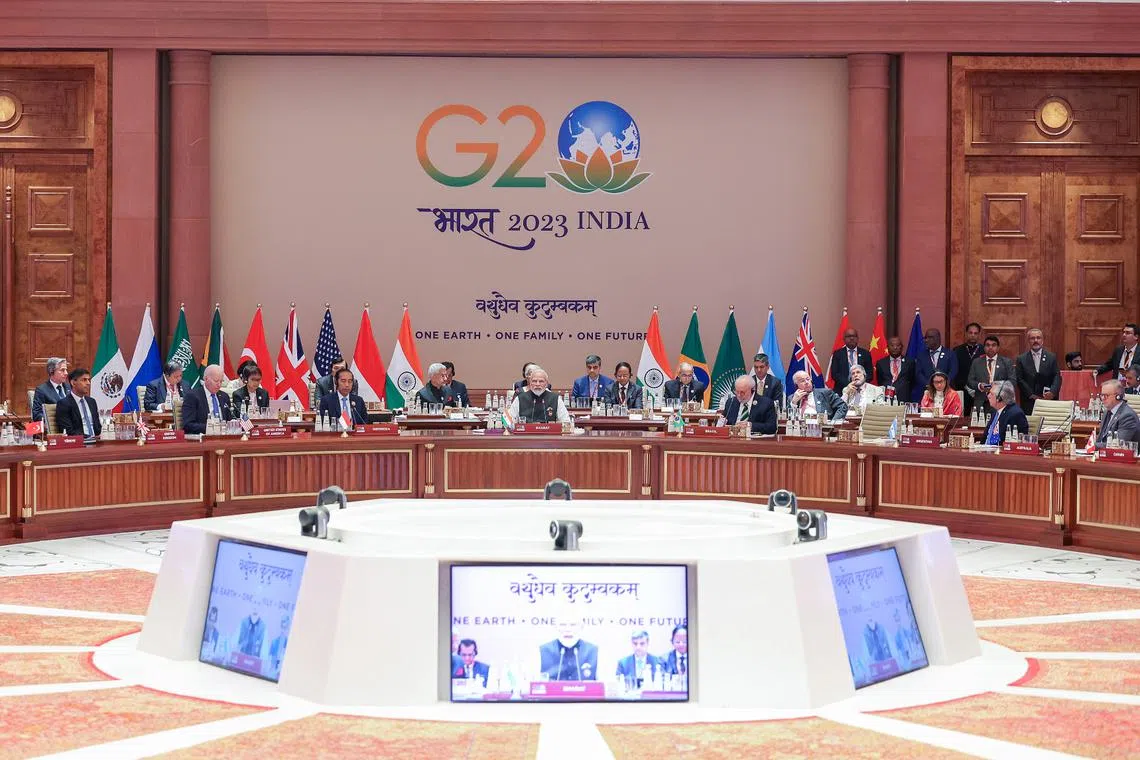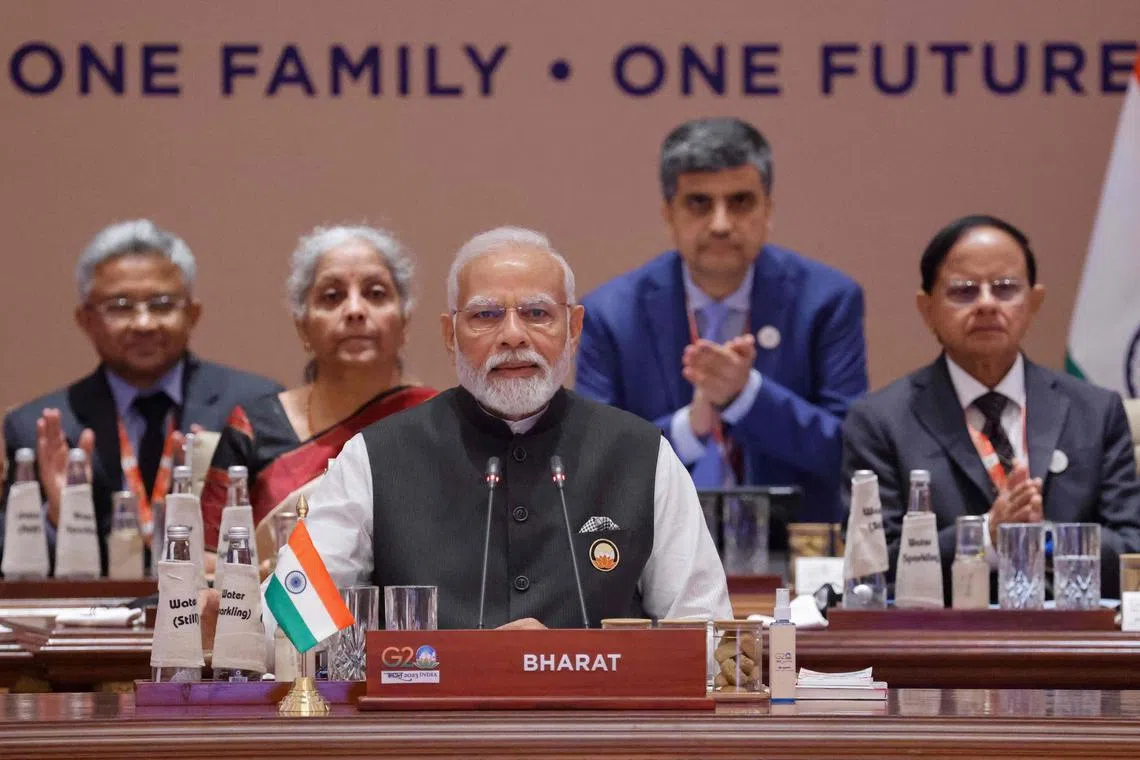In a surprise move, G-20 leaders release declaration amid Ukraine differences
Sign up now: Get insights on Asia's fast-moving developments

The declaration announced on Sept 9 was a big boost for India’s presidency of the G-20 grouping.
PHOTO: EPA-EFE
NEW DELHI - India pushed past the deep fault lines over the Ukraine war at the Group of 20 (G-20) leaders’ summit to forge consensus on a New Delhi declaration that refrained from directly condemning Russia.
In a big boost for India’s presidency of the grouping, Prime Minister Narendra Modi announced on Saturday, the first day of the two-day leaders’ summit in the capital city, that the declaration had been adopted by the G-20 leaders.
Negotiations over the wording on the Ukraine war went down to the wire. Indian officials revealed that the help of emerging economies Brazil, South Africa and Indonesia, the earlier G-20 chair, had been crucial in hammering out a compromise between the Western nations on one side and China and Russia on the other.
This involved convincing the Western countries to drop a reference to “the aggression by the Russian Federation against Ukraine”, which was included in the G-20 Bali declaration in 2022.
And then there were lengthy negotiations with Russia and China hours before the leaders’ summit, Mr Amitabh Kant, India’s sherpa or country representative for the G-20, told the local media.
The Delhi declaration said: “We call on all states to uphold the principles of international law including territorial integrity and sovereignty, international humanitarian law, and the multilateral system that safeguards peace and stability.”
Russian President Vladimir Putin was notably absent, as was his Chinese counterpart Xi Jinping. Russia was represented by its Foreign Minister Sergei Lavrov, and China by Premier Li Qiang.
Eight of the declaration’s 83 paragraphs were devoted to lengthy references to the Ukraine war.
Highlighting the economic fallout of the war, the declaration also referred to the Turkey and United Nations-brokered grain deal and called for its “full, timely and effective implementation” to facilitate the movement of grain, foodstuffs and fertilisers/inputs from the Russian Federation and Ukraine.
“This (Ukraine war) is today a polarising issue. There are multiple spectrums of views on this. In all fairness, it was right to record (in the joint declaration) the reality in meeting rooms,” said Indian External Affairs Minister S Jaishankar.
However, the Ukrainian Foreign Ministry said the joint declaration was “nothing to be proud of”
Still, ministry spokesman Oleg Nikolenko, in a Facebook post, said: “Ukraine is grateful to the partners who tried to include strong formulations in the text.”
The summit also saw a wide alliance of states backing ambitious infrastructure plans to bind the United States, Europe, the Middle East and India more closely together. On the sidelines of the summit, the US, India and Gulf countries announced a “historic” new railways and port corridor to link the regions.
Analysts see this move as a counter to China’s Belt and Road Initiative.
A flurry of bilateral meetings were also held on the sidelines.
Mr Modi and US President Joe Biden, who last met in June, met on Friday night to discuss a range of issues,
Mr Modi and Mr Biden reiterated their support for building resilient global semiconductor supply chains, committed to deepening the defence partnership, and welcomed efforts towards establishment of a working group for commercial space collaboration, said a joint statement.
A successful summit is seen as important for not just Mr Modi but also Mr Biden, who has also sought to sharpen the focus on the Global South, a group of diverse nations being wooed as well by China.
It also comes as China has gone about bulking up the Brics grouping of emerging economies, often pitched as a counter to Western-dominated groupings.
Analysts said it had been crucial for the G-20 to come out with a strong show of unity as parts of the globe slip into a recession and developing nations fight collapse due to high debt.
A recent United Nations report said the burden of debt overhang is battering the economies of many developing countries. As at last November, 37 out of 69 of the world’s poorest countries were either at high risk of or already in debt distress.
Addressing this issue, the Delhi declaration said the group pledged to reform multilateral development banks, proposed tight rules for cryptocurrencies, and focused on the problem of debt for low- and middle-income countries “in an effective, comprehensive and systematic manner”.
“At a time when the world is struggling with problems of debt overhang, high prices and exacerbating extreme weather events, it is important for the world’s most powerful economic group to lay out effective responses,” said Dr Amitendu Palit, a senior research fellow and research lead for trade and economics at the Institute of South Asian Studies at the National University of Singapore.
“It cannot afford to let these responses be constrained by divisions among world leaders.”
But even as Mr Modi emphasised the need for global unity in his opening address, the use of “Bharat” as the host country’s name

Indian Prime Minister Narendra Modi sat behind a placard that said Bharat at the leaders’ summit.
PHOTO: AFP
The use of Bharat, India’s historical name with Sanskrit origins, is supported by Hindu nationalists.
At the leaders’ summit, Mr Modi sat behind a placard that said Bharat, while summit officials from the host nation also wore badges with this name.
A summit dinner invitation sent out days ago, too, referred to President Droupadi Murmu as President of Bharat,
The opposition Congress, which is in an alliance called the Indian National Developmental Inclusive Alliance, abbreviated as “India”, has accused the government of deflecting attention from important issues and spoken out against abandoning the name India.
The government’s move has also triggered speculation that an upcoming surprise parliamentary session from Sept 18 to 22 is aimed at changing the name of the country from India to Bharat.



